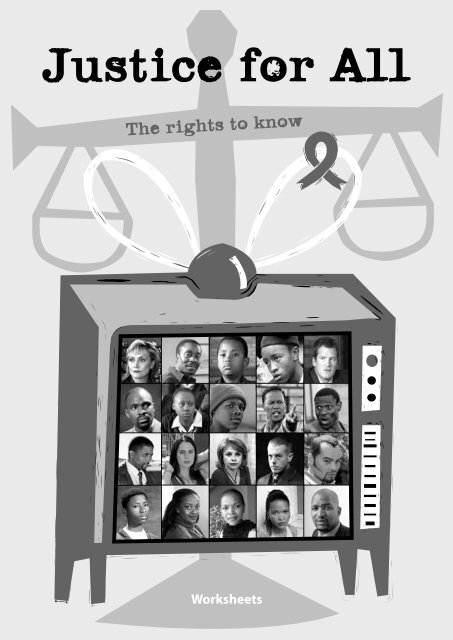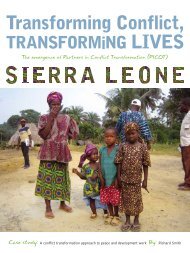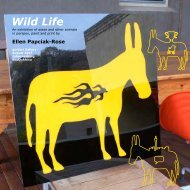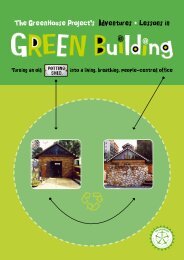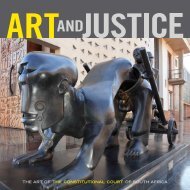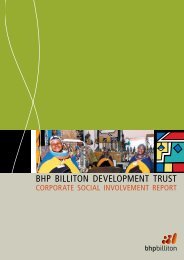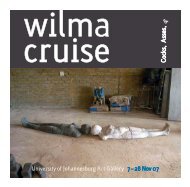CSVR_JFA Worksheets_.. - ELLEN PAPCIAK-ROSE
CSVR_JFA Worksheets_.. - ELLEN PAPCIAK-ROSE
CSVR_JFA Worksheets_.. - ELLEN PAPCIAK-ROSE
Create successful ePaper yourself
Turn your PDF publications into a flip-book with our unique Google optimized e-Paper software.
Worksheet 1 pg 1 Worksheet 2 pg 2 Worksheet 3 pg 3 Worksheet 4 pg 4<br />
Worksheet 5 pg 5 Worksheet 6 pg 6 Worksheet 7 pg 7 Worksheet 8 pg 8<br />
Worksheet 9 pg 9 Worksheet 10 pg 11 Worksheet 11 pg 12 Worksheet 12 (A) pg 14<br />
Worksheet 12 (B) pg 15 Worksheet 13 pg 16 Worksheet 14 pg 17 Worksheet 15 pg 18<br />
Published by the Centre for the Study of Violence and Reconciliation (<strong>CSVR</strong>)<br />
PO Box 30778<br />
Braamfontein 2017<br />
South Africa<br />
First published 2004<br />
© <strong>CSVR</strong> and DFIDSA<br />
This book is copyright under the Berne Convention. In terms of the Copyright Act No 98 of 1978, no part<br />
of this book may be reproduced or transmitted in any form or by any means, electronic or mechanical,<br />
including photocopying, recording or by any information storage or retrieval system, except with the<br />
permission of the publisher, which is given for specific reproducible parts. This book is supplied free to<br />
South African schools and may not be sold.<br />
ISBN 0-620-31547-4<br />
Acknowledgements<br />
The Justice for All 3 Outreach Project was generously funded by DFIDSA. The outreach material was<br />
developed from original scripts by Peter Goldsmid of Southern Exposure, for the SABC drama series,<br />
Justice for All 3. Professor Steve Tuson of Wits Law School reviewed the material and provided assistance<br />
with the legal aspects. Teachers and learners of Reashoma High School and JG Strijdom High School<br />
gave valuable time and feedback on pilot versions of the materials.<br />
While all efforts have been made to trace copyright holders, there may have been errors and omissions.<br />
<strong>CSVR</strong> would therefore welcome the opportunity of making suitable arrangements with copyright holders.<br />
Developed by<br />
Charlotte Hulley and Heather Barclay of <strong>CSVR</strong><br />
Project management of the print materials by<br />
Charlotte Hulley of <strong>CSVR</strong> and Catherine Damerell of CD Consultants<br />
Project management of the video material by<br />
Margaret Goldsmid of Southern Exposure<br />
Graphic design and illustration by<br />
Ellen Papciak-Rose of Soweto Spaza cc<br />
Still photographs by<br />
Emil Wessels for Southern Exposure<br />
Printed and bound in the Republic of South Africa by<br />
Ultra Litho<br />
For more information on <strong>JFA</strong> materials, call the <strong>CSVR</strong> on 011 403 5650. www.csvr.org.za
Worksheet 1: When needs are not met...<br />
Justice for All The rights to know<br />
1 With a partner, read the stories and then answer the<br />
questions that follow.<br />
Scenario 1: Pule has been abandoned by his mother. She went off<br />
to live with her boyfriend. Pule wants to get back to<br />
his mother and tries to steal a bakkie to get home in.<br />
= What basic need of Pule’s is not being met? .....................................................................................................................................<br />
= What action does Pule take to meet this need? ...............................................................................................................................<br />
= Is this action a responsible one? ...........................................................................................................................................................<br />
= Explain why you think so. ........................................................................................................................................................................<br />
Scenario 2: Zanele has come to the city to look for work, but she cannot find anywhere<br />
to stay. She illegally builds a shack on an open area of land.<br />
= What basic need of Zanele’s has not been met? ..............................................................................................................................<br />
= What action does Zanele take to meet this need? ..........................................................................................................................<br />
= Is this action a responsible one? ...........................................................................................................................................................<br />
= Explain why you think so. ........................................................................................................................................................................<br />
Scenario 3: Neo cannot afford to pay his school fees and the school says he will have<br />
to leave. He starts to sell dagga to make money to pay his school fees.<br />
= What basic need of Neo’s has not been met? ...................................................................................................................................<br />
= What action does Neo take to meet this need? ................................................................................................................................<br />
= Is this action a responsible one? ...........................................................................................................................................................<br />
= Explain why you think so. .......................................................................................................................................................................<br />
2 Now discuss the following statement in groups. Do you agree with it or not?<br />
Report back to the class and support your answer.<br />
The South African Bill of Rights says all South Africans have<br />
a right to food, shelter and education. Therefore the people in<br />
the stories have not committed a criminal offence.<br />
Theme 1: Talking about rights - Lesson 2 Needs and wants? 1
Worksheet 2: When it’s just not right<br />
Justice for All The rights to know<br />
Sello has been hurt twice. First he was<br />
raped; then, when he told his story,<br />
he was not believed. What thoughts<br />
do you think are going around in<br />
Sello’s head? Write them in the<br />
thought bubble.<br />
1 Look at the human rights below and choose<br />
from the list the ways in which Sello has been<br />
hurt and abused in each of his experiences.<br />
Complete the table by explaining how this right<br />
has been abused. (Copy the table on a sheet of<br />
paper if you need more space.)<br />
= Right to equality<br />
= Right to privacy<br />
= Right to human dignity<br />
= Right to freedom of<br />
religion and belief<br />
= Right to life<br />
= Right to health care<br />
= Right to freedom<br />
= Right to food and water<br />
= Right to safety<br />
= Right to be protected<br />
The rape<br />
Not being believed<br />
2 What kind of support do you think Sello needs, to help him cope with the trauma<br />
he has experienced?<br />
...............................................................................................................................................................................................................................<br />
...............................................................................................................................................................................................................................<br />
2<br />
Theme 2: Taking the law into your own hands - Lesson 1 Being doubly victimised
Worksheet 3: What would they say? Dealing with conflict<br />
Justice for All The rights to know<br />
Sello’s mother, Dudu, goes to confront Thato, the neighbour who abused her son.<br />
1 In groups, look at the series of photographs below and write the dialogue<br />
between Dudu and Thato.<br />
...........................................................................<br />
....................................................................................<br />
....................................................................................<br />
...........................................................................<br />
....................................................................................<br />
....................................................................................<br />
...........................................................................<br />
....................................................................................<br />
....................................................................................<br />
...........................................................................<br />
....................................................................................<br />
....................................................................................<br />
2 Compare your dialogue with other groups. What is similar and what is different<br />
about the dialogues? What would you change in your own group’s dialogue?<br />
Theme 2: Taking the law into your own hands - Lesson 1 Being doubly victimised<br />
3
Worksheet 4: Taking action – right or wrong?<br />
Justice for All The rights to know<br />
Dudu is angry and frustrated<br />
that the justice system takes<br />
no action against Thato for<br />
abusing her child.<br />
Dudu takes action against Thato with a mob<br />
1 In groups discuss the following<br />
questions. Write down your<br />
group’s answers.<br />
= What action did Dudu take?<br />
.........................................................................................................................................................................................................................<br />
= What reason would the community have to take part in this action?<br />
.........................................................................................................................................................................................................................<br />
= Why do you think the community decided to punish Thato themselves?<br />
.........................................................................................................................................................................................................................<br />
= Do you think this type of violence is acceptable?<br />
.........................................................................................................................................................................................................................<br />
= How else could the community have handled this problem?<br />
.........................................................................................................................................................................................................................<br />
= What do you think will happen next?<br />
.........................................................................................................................................................................................................................<br />
= Do you know of any other cases where people have taken the law into their own hands?<br />
What happened and how do you feel about it?<br />
.........................................................................................................................................................................................................................<br />
2 Report back your group’s answers in class. How do they compare?<br />
4<br />
Theme 2: Taking the law into your own hands - Lesson 2 Getting justice your own way
Worksheet 5: What is a cycle of violence?<br />
Justice for All The rights to know<br />
Look at the diagram and notice how one violent action leads to another<br />
violent situation. A chain of events is started, with each event leading<br />
to a worse one.<br />
7 Sello is now<br />
alone at<br />
home with no<br />
caregiver.<br />
1 Sello is raped<br />
by Thato.<br />
2 The police are<br />
unable to arrest<br />
Thato. They<br />
tell Dudu that<br />
they don’t have<br />
enough evidence.<br />
6 Dudu is sent<br />
to prison.<br />
Cycle<br />
of<br />
violence<br />
3 Dudu organises<br />
mob action.<br />
5 Dudu is charged<br />
with murder<br />
as she was<br />
identified as part<br />
of the mob.<br />
4 Thato is killed<br />
by a man in<br />
the mob.<br />
1 In small groups,<br />
discuss what will<br />
become of Sello.<br />
2 Now choose two violent<br />
situations from the diagram<br />
and discuss how they could<br />
have been prevented.<br />
3 One person in your<br />
group reports back<br />
to the class.<br />
Theme 2: Taking the law into your own hands - Lesson 3 Cycles of violence<br />
5
Worksheet 6: What is wrong with this relationship?<br />
Justice for All The rights to know<br />
What do Lindiwe and Frank each<br />
think about their relationship ?<br />
1 With a partner, complete these sentences –<br />
Did you know...?<br />
Lindiwe:<br />
I hope that ............................................................................................................................................<br />
I’m scared that .....................................................................................................................................<br />
Frank:<br />
I hope that ............................................................................................................................................<br />
I’m scared that .....................................................................................................................................<br />
2 In groups, discuss this question and report back to the class –<br />
Why do you think it is forbidden for a teacher<br />
to have a sexual relationship with a learner,<br />
even if the learner is over the age of 16?<br />
Sexual relationships between<br />
teachers and learners are<br />
forbidden. This is in line with<br />
the teachers’ code of conduct<br />
(SACE). If a teacher has a sexual<br />
relationship with a learner, the<br />
teacher will be held responsible<br />
and disciplinary measures will<br />
be taken against him/her. A<br />
learner should be able to report<br />
any inappropriate behaviour<br />
without fearing negative<br />
consequences.<br />
6<br />
Theme 3: Dealing with sexual harassment<br />
- Lesson 1 Thinking about learner-teacher relationships
Worksheet 7: You are a reporter<br />
Justice for All The rights to know<br />
You are a court reporter. You have been following Lindiwe’s trial with<br />
interest and you are now going to write an article on the story for the<br />
newspaper. You interview Lindiwe and Frank as they come out of court.<br />
1 In groups of four, each of you will act out one of these roles –<br />
reporter, Lindiwe, Frank and Ntsoaki.<br />
You start with Frank<br />
and ask him these<br />
questions –<br />
= What happened?<br />
= What have you<br />
thought about since<br />
the incident?<br />
= Who do you think has<br />
been affected by your<br />
actions?<br />
= How have they been<br />
affected?<br />
Next you interview<br />
Lindiwe –<br />
= How do you feel<br />
about what has<br />
happened?<br />
= What has been the<br />
hardest thing for you?<br />
= What do you think are<br />
the main issues?<br />
2 Using the information from the video and from your<br />
interviews, write an article for a newspaper. Think of<br />
a title for your article, and how you will present the<br />
different points of view.<br />
Then you go to the<br />
school and interview<br />
Ntsoaki, Lindiwe’s<br />
friend –<br />
= How do you feel<br />
about what has<br />
happened?<br />
= Are relationships<br />
between learners and<br />
teachers common in<br />
your school?<br />
= What other kinds of<br />
unacceptable sexual<br />
behaviour take place<br />
in your school?<br />
= How are incidents like<br />
this handled by the<br />
school?<br />
3 Display your group’s article in the class for everyone to<br />
read and discuss.<br />
Theme 3: Dealing with sexual harassment - Lesson 3 Telling the whole story 7
Worksheet 8: Make the right choice<br />
Justice for All The rights to know<br />
Work on your own as you<br />
think about life choices.<br />
1 Here are some choices that you may need<br />
to make over the next year. Tick the ones<br />
that you think you may need to make.<br />
c Will I go on to Grade 10?<br />
c What kind of friends do I want to be with?<br />
c Who will be my boyfriend/girlfriend?<br />
c Will I have sex?<br />
c Will I practise safer sex and use contraception?<br />
c Will I smoke?<br />
c How will I relate to my parent(s)?<br />
c Will I drink?<br />
c Will I take drugs?<br />
c What will I do for my community?<br />
c Will I join a gang?<br />
c Will I own a knife or gun?<br />
c What values do I believe in?<br />
When I chose to<br />
take the cocaine to sell<br />
I never thought that I might<br />
be caught or even have to go to<br />
jail. I just wanted to make<br />
my boyfriend like<br />
me more.<br />
2 Choose three important choices that you have to make over the next year and make<br />
a decision about them. Think about the consequences of the decision you have<br />
made and who or what has influenced your decision. Then fill in this table:<br />
Choice Decision Positive results Negative results Influences<br />
Go on to Grade 10<br />
Leave school at the<br />
end of this year<br />
Earn money<br />
Be more independent<br />
Miss my friends<br />
Not find a job<br />
Not complete my<br />
education<br />
Friends with money<br />
My family needs more<br />
money<br />
8<br />
Theme 4: Making good decisions - Lesson 2 Making choices
Worksheet 9: Say what you mean<br />
Justice for All The rights to know<br />
Here is a scene from<br />
the video you have just<br />
watched. How do you<br />
think Shannon could have<br />
asserted herself instead of<br />
going along with Max, or<br />
getting angry with him?<br />
1 On your own read through the<br />
scene that shows what happens.<br />
Max has tricked Shannon by pretending to be her friend.<br />
She is angry with him – she wants to tell him how much<br />
she detests what he has done and that she doesn’t want to<br />
see him again. She walks up to Max and slaps his face.<br />
2 Now read the table of options to see how Shannon could have behaved more assertively.<br />
What to do What to say Say it like this …<br />
Explain your feelings<br />
and the problem<br />
Make your request<br />
Ask the other person<br />
how he/she feels<br />
Listen to the answer<br />
Refuse or delay<br />
I feel frustrated when…<br />
I feel unhappy when…<br />
It hurts me when…<br />
I don’t like it when…<br />
I would like it better if...<br />
Please don’t...<br />
I wish you would…<br />
How do you feel about that?<br />
What do you think?<br />
Is that alright with you?<br />
The other person responds.<br />
He/she may try to persuade you<br />
or get you off the topic.<br />
No. I really mean no!<br />
I’m leaving!<br />
I’d like to think about it.<br />
Maybe we can talk later.<br />
Shannon: “I am angry with you because you tricked<br />
me and my boyfriend.”<br />
Shannon: “I don’t want to see you or speak to<br />
you again.”<br />
Shannon: “What do you think? Will you please leave<br />
me alone?”<br />
Max: “C’mon Shannon. I had to defend myself. It<br />
wasn’t personal.”<br />
Shannon: “I don’t agree. It was personal to me.<br />
And I’m going.”<br />
Theme 4: Making good decisions - Lesson 3 What does it take to be assertive?<br />
9
Worksheet 9: Say what you mean continued<br />
Justice for All The rights to know<br />
3 With a partner read the next scene.<br />
The friend who is supposed to give you a ride home is<br />
drunk and you don’t feel safe driving with him. He says<br />
that he is fine to drive.<br />
4 Using the table of options as a guide, fill in your own assertive responses<br />
(in the third column).<br />
What to do What to say Say it like this …<br />
Explain your feelings<br />
and the problem<br />
I feel frustrated when…<br />
I feel unhappy when…<br />
It hurts me when…<br />
I don’t like it when…<br />
You say it like this...<br />
Make your request<br />
I would like it better if...<br />
Please don’t...<br />
I wish you would…<br />
You say it like this...<br />
Ask the other person<br />
how he/she feels<br />
How do you feel about that?<br />
What do you think?<br />
Is that alright with you?<br />
You say it like this...<br />
Listen to the answer<br />
The other person responds.<br />
He/she may try to persuade you<br />
or get you off the topic.<br />
Friend says this...<br />
Refuse or delay<br />
No. I really mean no!<br />
I’m leaving!<br />
I’d like to think about it.<br />
Maybe we can talk later.<br />
Friend says this...<br />
5 Now with your partner plan to role-play a situation of your own in which you need<br />
to be assertive. Perform your role-play for the class.<br />
10<br />
Theme 4: Making good decisions - Lesson 3 What does it take to be assertive?
Worksheet 10: What’s wrong with this relationship?<br />
Justice for All The rights to know<br />
BEHAViLURS<br />
Kamo deceived Disebo in a<br />
very dangerous way when<br />
he did not tell her that he<br />
was HIV-positive. He was<br />
controlling her by deceiving<br />
her. There are many more<br />
ways of being controlled,<br />
and of trying to control in<br />
a relationship.<br />
1 On your own, think of<br />
a close friendship or<br />
relationship that you<br />
have. Tick any of the<br />
behaviours that you<br />
have experienced in<br />
this relationship, in<br />
the boxes.<br />
2 If you ticked more than<br />
two or three of these items,<br />
you need to think about<br />
how one person is trying<br />
to control the other person<br />
in this relationship. This is<br />
abusive behaviour. Healthy<br />
relationships involve<br />
understanding, accepting<br />
and respecting oneself and<br />
the other person. Where can<br />
you get help and advice?<br />
Criticism<br />
L Does this person<br />
c call you names (e.g. idiot,<br />
cow, freak)?<br />
c make fun of you in public?<br />
c belittle you?<br />
Mind games<br />
L Does this person<br />
c act cruelly and then say<br />
you can’t take a joke?<br />
c tell you that you are<br />
crazy?<br />
Decision making<br />
L Does this person<br />
c make all the decisions?<br />
c control all the money?<br />
c tell you what to do?<br />
Moodiness and<br />
threats<br />
c If you are 5 minutes late<br />
are you afraid this person<br />
will be angry?<br />
c Do you walk around<br />
nervously because you<br />
don’t know what will<br />
make this person cross?<br />
L Does this person<br />
c sulk in silence?<br />
c make threats against you?<br />
Physical violence<br />
L Does this person<br />
c throw things around?<br />
c kick you?<br />
c push you?<br />
c slap or hit you?<br />
c threaten you with a<br />
weapon?<br />
c force you to have sex?<br />
Jealousy<br />
L Does this person<br />
c want you at home<br />
because he/she says they<br />
are worried about you?<br />
c check up on you?<br />
c tell you what to wear and<br />
what not to wear?<br />
c go out, but never allow you<br />
to go out?<br />
Intimidation<br />
L Does this person<br />
c block the door so you<br />
can’t get out during an<br />
argument?<br />
c stand close to you with<br />
clenched fists during a<br />
fight to scare you?<br />
c drive recklessly just to<br />
scare you?<br />
c destroy your clothes or<br />
possessions?<br />
c refuse to leave if you ask<br />
him/her to go?<br />
Theme 5: It takes honesty in a relationship - Lesson 1 Good relationships and bad relationships 11
Worksheet 11: Your right to decide<br />
Justice for All The rights to know<br />
You probably know that boys and men sometimes have<br />
different ideas about sex from girls and women.<br />
1 Do the quiz below in pairs and then discuss your answers in class.<br />
A Put agree or disagree after each statement:<br />
Statement<br />
1 If a lot of money is spent on a date, sex should be given in return.<br />
2 When someone says ‘no’ to sex, it means that he/she does not like the other person.<br />
3 A real man is one who has had sex with a woman.<br />
4 Someone who dresses in a sexy way wants to have sex.<br />
5 If a girl/boy accepts an invitation to go to someone’s house alone, he/she is willing to have sex.<br />
6 The success of a date can be judged by how sexual it is.<br />
7 When a girl/woman says ‘no’ to sex, it really means ‘maybe’, and ‘maybe’ usually means ‘yes’.<br />
8 It is the girl’s/woman’s responsibility to say how sexual a relationship becomes.<br />
9 You can’t start something sexual without finishing it.<br />
Agree/disagree<br />
B After discussing your answers write a new statement that you think would be<br />
better for both boys/men and girls/women.<br />
= If a lot of money is spent on a date .................................................................................................................................................................. .<br />
= When a person says ‘no’ to sex it means ........................................................................................................................................................ .<br />
= You are a real man if ............................................................................................................................................................................................. .<br />
= If someone dresses or acts in a sexy way ....................................................................................................................................................... .<br />
= If a person wants to go to someone’s house when there is no one else at home ............................................................................. .<br />
= The success of an evening out should be judged on ................................................................................................................................. .<br />
= ‘No’ to sex really means ....................................................................................................................................................................................... .<br />
= The responsibility for setting sexual limits .................................................................................................................................................... .<br />
= You can ..................................................................................................................................................................................................................... .<br />
12<br />
Theme 5: It takes honesty in a relationship - Lesson 2 Do you agree?
Worksheet 11: Your right to decide continued<br />
Justice for All The rights to know<br />
C In a relationship you have the right to say no to sex. You also have a responsibility to<br />
make clear decisions about sex and to be honest with your boyfriend/girlfriend.<br />
2 In the first column of the table are some other things that you have a right to expect.<br />
Read them on your own and add any other rights that are important to you.<br />
The right to<br />
Honesty<br />
The responsibility that goes with it<br />
Feel safe<br />
Be listened to<br />
Respect<br />
Make decisions<br />
To choose<br />
Express feelings<br />
Be asked<br />
When someone invites you and your boyfriend/girlfriend to a party you really<br />
want to go to, you say that you want to check with him/her first.<br />
Be accepted<br />
Be supported<br />
3 For every right that we have, we also have a responsibility. For each right, think of an<br />
example of the kind of responsibility that goes with it. Write a sentence about it. One has<br />
been done for you in the table.<br />
Theme 5: It takes honesty in a relationship - Lesson 2 Do you agree? 13
Worksheet 12 (Part A): Am I ready for this?<br />
Justice for All The rights to know<br />
1 Read the story with a partner and then answer the questions.<br />
Shannon is 15. She met Damien at a rave. She really<br />
liked him and when he asked to see her again she was<br />
excited at first but then she felt worried.<br />
He is 24 and she knows that he will probably want to<br />
have sex with her. But she also knows that he has other<br />
girlfriends. She isn’t sure if he always uses a condom or<br />
what the chances of getting HIV are.<br />
At the same time, Shannon is scared that she might<br />
lose him if she doesn’t have sex with him. Some of<br />
her friends have had sex and talk about it all the time. But she<br />
doesn’t know if she is ready yet. She thinks she would<br />
rather wait until she knows Damien better. Besides, her mother<br />
became pregnant with her when she was only 17 and Shannon<br />
doesn’t want to have a baby while she is still so young.<br />
2 Should Shannon say yes or no to sex? Here are some reasons for saying yes or no.<br />
Tick the ones that apply to Shannon.<br />
Shannon’s reasons for saying<br />
YES (tick)<br />
G/P<br />
Shannon’s reasons for saying<br />
NO (tick)<br />
G/P<br />
¨ To prove her love for Damien<br />
..........<br />
¨ Fear of pregnancy<br />
..........<br />
¨ Fear that the relationship might break<br />
up if she does not<br />
¨ Curiosity about sex<br />
¨ Knowing that friends are all having sex<br />
¨ Because it feels right<br />
¨ To be more popular<br />
¨ For money or presents<br />
¨ Fear of being beaten up<br />
¨ Because Damien convinces her<br />
there will be no problems<br />
..........<br />
..........<br />
..........<br />
..........<br />
..........<br />
..........<br />
..........<br />
..........<br />
¨ Fear of sexually transmitted diseases (STDs)<br />
¨ Fear of HIV/AIDS<br />
¨ Family expectations<br />
¨ Religious or cultural beliefs<br />
¨ Allow friendship to grow first<br />
¨ There are other ways of showing affection<br />
¨ Not ready<br />
¨ Not with the right person<br />
¨ Wants to wait until marriage<br />
..........<br />
..........<br />
..........<br />
..........<br />
..........<br />
..........<br />
..........<br />
..........<br />
..........<br />
3 Now look at each reason and decide whether it is a good reason (G) or a poor reason (P).<br />
14<br />
Theme 5: It takes honesty in a relationship - Lesson 3 Say what you mean
Worksheet 12 (Part B): Am I ready for this?<br />
Justice for All The rights to know<br />
Help! Hotline<br />
1 Using the information in Part A of<br />
Worksheet 12 and the helpful guidelines<br />
below, write a response to these learners<br />
who have sent letters about their<br />
problems. Work in groups of three.<br />
Help with sexual<br />
situations<br />
Dear Vanessa,<br />
My boyfriend and I have been seeing each<br />
other for six months now. We have not had<br />
sex yet because we agreed that we are not<br />
ready. But I can’t stop thinking about it.<br />
We are going to a party at the end of<br />
term and I think maybe this will be a good<br />
time to do it.<br />
Should I have sex with Khalil?<br />
-Unsure<br />
1 Go to parties and other social events<br />
with friends<br />
2 Decide how ‘far you want to go’ before<br />
being in a pressure situation<br />
3 Decide your alcohol limits before being<br />
in a pressure situation<br />
4 Be clear about your limits – don’t give<br />
mixed messages<br />
5 Pay attention to your feelings – leave if<br />
you feel uncomfortable<br />
6 Get involved in activities such as<br />
sports, clubs, hobbies<br />
7 Avoid hanging out with people who<br />
might pressure you to have sex<br />
8 Be honest from the beginning by<br />
saying if you don’t want to have sex<br />
9 Avoid going out with people you<br />
can’t trust<br />
10 Avoid secluded places where you<br />
can’t get help<br />
11 Do not accept rides from people you<br />
don’t know or can’t trust<br />
12 Don’t accept presents and money<br />
from people you don’t know very<br />
well or trust<br />
13 Avoid falling for romantic lines and<br />
flattering arguments<br />
14 Avoid going to someone’s room or<br />
house when there is no one else there<br />
15 Explore ways of showing affection<br />
other than sex<br />
Dear Vanessa,<br />
Since my boyfriend started hanging around<br />
with a gang that drinks and smokes dope,<br />
he’s changed. He’s started being rude to me.<br />
Sometimes he ignores me and other times he<br />
acts all jealous. One of the gang even gave me<br />
a present and asked me to go home with him.<br />
I don’t want to lose my guy, but can you<br />
help me with what to do?<br />
-Worried and scared<br />
Dear Vanessa,<br />
I am 16 and I have not had sex yet. All my<br />
friends tease me and call me names. Now<br />
I have met a girl I really like and she has<br />
invited me to her house because her parents<br />
are away. What should I do?<br />
-Confused<br />
2 Pass your letters to another group. Discuss the<br />
letters other groups pass to you.<br />
Theme 5: It takes honesty in a relationship - Lesson 3 Say what you mean 15
Worksheet 13: Who do you choose?<br />
Justice for All The rights to know<br />
Age<br />
Race<br />
Looks<br />
1 Read the stories and decide on<br />
your own which of the five people<br />
you would choose as a friend.<br />
2 Discuss your choice with a partner.<br />
What made you choose your<br />
friend? Rate each item from 1(not<br />
important)—7(most important) in<br />
the table below.<br />
Where they live<br />
Personality<br />
Interests<br />
Similar life experiences<br />
Other..................................<br />
What does this<br />
tell you about<br />
what you value<br />
in another<br />
person?<br />
Shannon is 15 years old. She<br />
lives with her mother in a flat in<br />
Hillbrow. She is captain of her<br />
school’s hockey team. She enjoys<br />
going to raves and clubs, where she<br />
occasionally takes drugs. She is a bit<br />
of a rebel.<br />
Sello is 11 years old. He lives<br />
with his mother in a township<br />
and attends school there. He is<br />
very popular with his classmates,<br />
because he is friendly, has a sense<br />
of humour and is helpful. He is also<br />
good at art and sport.<br />
Shani is 14 years old and lives with<br />
his mother and sister in a house in<br />
town. His mother kicked his father<br />
out because he drank too much.<br />
He enjoys surfing the Internet and<br />
reading comics about fighting<br />
and war. He spends time with his<br />
friends partying and drinking, but<br />
sometimes tends to drink too much.<br />
Lindiwe is 14 years old. Her father<br />
died last year and she has been<br />
quite depressed. She is physically<br />
very attractive and is liked by her<br />
classmates, although she tends<br />
to show off a bit. She is having a<br />
sexual relationship with one of<br />
her teachers.<br />
Damien is 24 and an undercover<br />
cop who lives a double life. He<br />
enjoys the dangers and risks that<br />
it involves. He’s a hard, tough guy<br />
who can be aggressive and abusive<br />
in his relationships, particularly<br />
with women.<br />
16<br />
Theme 6: Thinking about us and them - Lesson 1 Who would you choose?
Worksheet 14: Who are they really?<br />
Justice for All The rights to know<br />
Can we tell just from looking at<br />
a person who they really are?<br />
A<br />
B<br />
1 In groups of three, look at the pictures<br />
and decide who<br />
= Is a lawyer ____<br />
I<br />
= Is a murderer ____<br />
= Is a rapist ____<br />
F<br />
= Is a drug dealer ____<br />
J<br />
= Is a minister ____<br />
= Is a child molester ____<br />
= Is a policeperson ____<br />
K<br />
= Is a farmer ____<br />
= Is HIV-positive ____<br />
G<br />
E<br />
D<br />
= Is a teacher ____<br />
= Is a thief ____<br />
L<br />
= Is a businessperson ____<br />
H<br />
2 What have you learnt from this<br />
activity? Write a paragraph and<br />
share it with the class.<br />
C<br />
Theme 6: Thinking about us and them - Lesson 2 Thinking about others 17
Worksheet 15: Play the game (The instructions)<br />
Justice for All The rights to know<br />
The Identity game – We are all winners!<br />
About the game<br />
1 Up to six players can play at a time.<br />
2 Go around the board at least once (depending on time and the number of<br />
players) so that each player will have answered a significant number of questions.<br />
3 If you answer the questions honestly, you will be more prepared to face the<br />
difficulties and expectations that are put on you by your peers. You will be more<br />
aware of your own values and be able to identify areas/situations in your life and<br />
behaviour that require more reflection.<br />
You will need<br />
- A counter for each player (coins, buttons, stones, bottle tops, etc.)<br />
- One die<br />
- The board<br />
- The questions<br />
Rules of the game<br />
1 Roll the die and move your counter according to the number you rolled. The space<br />
you land on has a picture on it. Each picture represents a theme and there are 20<br />
questions for each theme. As the players land on the themes, work down the list of<br />
questions for that theme, answering one question per turn.<br />
2 Respond to the questions as honestly as you can. If you cannot answer honestly,<br />
you may ‘pass’ on the question. Fellow players can ask for clarification or<br />
reasons for your response. They can also challenge you if they feel that you are<br />
not being honest!<br />
3 Do not rush through the questions; the point of the game is to engage with<br />
each other in a meaningful way.<br />
4 When you have come to the end of the game, discuss what you have learned<br />
– about yourselves as individuals and about general attitudes towards identity.<br />
It is important also to discuss what you think you might need to do better, to<br />
prepare yourself for life’s difficult situations.<br />
18<br />
Theme 6: Thinking about us and them - Lesson 3 Play the game
Worksheet 15: Play the game (The questions)<br />
Justice for All The rights to know<br />
Theme 1:<br />
Talking about rights<br />
Theme 2:<br />
Taking the law into your own hands<br />
1 What are rights?<br />
2 Can you explain what a code of conduct is?<br />
3 Why is it necessary to have a code of conduct?<br />
4 How would you show respect towards someone<br />
who is telling you about a problem?<br />
5 What are everyone’s basic needs/rights? Give<br />
examples of at least three basic needs.<br />
6 Give examples of three things that are ‘wants’<br />
and not ‘needs’.<br />
7 Whose responsibility do you think it is to meet<br />
people’s basic needs? Why?<br />
8 Why can you not be kicked out of school for<br />
not paying fees?<br />
9 Give an example of how you could show<br />
justice and caring to a learner who has stolen<br />
someone’s tuck money.<br />
10 Would you say everyone in your class has their<br />
language rights respected? Give an example.<br />
11 Would you say everyone in your school has their<br />
right to equality respected? Give an example.<br />
12 Do you think street children who steal are<br />
criminals? Explain.<br />
13 Do you think it’s okay to steal from a<br />
supermarket? Explain.<br />
14 If you had to choose only one right, what right<br />
would you choose and why?<br />
15 How do you benefit from democracy in<br />
South Africa?<br />
16 Do you respect the right of people to have<br />
same sex relationships? Why?<br />
17 How have you disrespected democratic<br />
principles in your relationships?<br />
18 Have you ever held a gun? How did you feel?<br />
19 How can you reduce violence?<br />
20 What do you miss most about childhood?<br />
1 How do you feel when people don’t<br />
believe you?<br />
2 Have you ever lied to get someone out<br />
of trouble?<br />
3 What kind of events can traumatise people?<br />
4 What do you think ‘justice’ is?<br />
5 Give some reasons why the police sometimes<br />
cannot prosecute a case?<br />
6 Why do you think some people don’t trust the<br />
police to do their job properly?<br />
7 What do we mean by a ‘cycle of violence’?<br />
8 What do we mean by a ‘culture of violence’?<br />
9 Is it okay to act violently towards someone if<br />
they have hurt you?<br />
10 Do you believe in revenge? Explain.<br />
11 Would you sell drugs to make a ‘quick buck’?<br />
12 Have you ever stolen from a friend? How<br />
did it make you feel?<br />
13 Have you ever taken money that wasn’t yours?<br />
Why/why not?<br />
14 What is the best way to ensure justice in<br />
South Africa?<br />
15 Have you ever suffered harm or loss as a result<br />
of crime? Explain.<br />
16 Are you afraid to walk on your own in the area<br />
where you live?<br />
17 How could you help to make your community<br />
safe for young adults?<br />
18 Do you think mob justice is acceptable? Explain.<br />
19 Does your mother/father/guardian take an<br />
interest in your problems?<br />
20 Who do you get advice from in difficult<br />
situations? Why?<br />
19
Worksheet 15: Play the game (The questions)<br />
Justice for All The rights to know<br />
Theme 3:<br />
Dealing with sexual harassment<br />
Theme 4:<br />
Making good decisions<br />
1 If a teacher makes advances to you, what<br />
would you do?<br />
2 What would you say to a friend who was having<br />
a relationship with a teacher?<br />
3 If you found your teacher attractive, would<br />
you tell him/her?<br />
4 Does a teacher have the right to sexually<br />
harass you?<br />
5 Who would you tell if a teacher was sexually<br />
harassing you?<br />
6 Is it okay to flirt with your teacher?<br />
7 Is it okay for your teacher to flirt with you?<br />
8 If your teacher continually makes comments<br />
about how you look, would you report him/her?<br />
9 How would you explain to the principal that a<br />
teacher was making advances to you?<br />
10 Is it okay to go on a date with a teacher?<br />
11 If your teacher offers you a ride home,<br />
would you accept?<br />
12 How do you explain the reasons for such high<br />
levels of rape in South Africa?<br />
13 When have you acted ‘like a man’ or ‘like a<br />
woman’ to get something you wanted?<br />
14 What do you like most about being a<br />
boy or a girl?<br />
15 What attracts/does not attract you about<br />
an older man or woman?<br />
16 What makes you vulnerable if you have a<br />
relationship with your teacher?<br />
17 What is the most romantic moment in your<br />
life so far?<br />
18 What one quality would you like your<br />
partner to have?<br />
19 Would you like to marry someday? Why?<br />
20 Is there such a thing as your ‘perfect partner’?<br />
1 What is your understanding of ‘good decisions’?<br />
2 Have you ever been drunk?<br />
3 Do you drink with your friends?<br />
4 What do you enjoy about drinking?<br />
5 What do you dislike about being drunk?<br />
6 Have you been in a situation where you did not<br />
want to do something and were persuaded by<br />
your friends?<br />
7 Is it okay to make someone feel stupid if they<br />
don’t want to do what you want to do?<br />
8 Give an example of a time when you said<br />
no to your friends.<br />
9 Is it hard or easy for you to say no to your friends?<br />
10 Do you think smoking dagga is cool?<br />
11 Would you think of using alcohol or drugs to<br />
give you confidence in a difficult situation?<br />
12 What is the most stupid thing you have<br />
done when you were drunk?<br />
13 How does your behaviour change when<br />
you drink?<br />
14 What do you do often that irritates people?<br />
15 How do you make decisions?<br />
16 Have you ever run away from home? Why?<br />
17 Have you ever stayed up all night? Why?<br />
18 Do you think about dropping out of<br />
school? Why?<br />
19 Do your parents/caregivers abuse alcohol?<br />
20 Have you ever been arrested by the police?<br />
Why?<br />
20
Worksheet 15: Play the game (The questions)<br />
Justice for All The rights to know<br />
Theme 5:<br />
It takes honesty in a relationship<br />
Theme 6:<br />
Thinking about us and them<br />
1 Do you think you would be richer or poorer if<br />
you were the opposite sex?<br />
2 What do you find attractive about<br />
another person?<br />
3 If you had a child, would you prefer to have a<br />
daughter or a son?<br />
4 Which jobs do you think are inappropriate<br />
for a woman?<br />
5 Can rape take place in a relationship?<br />
6 Is rape the only form of abuse that can take<br />
place in a relationship?<br />
7 What safer sex practices would you recommend<br />
to a friend?<br />
8 What things do you look for in a sexual partner?<br />
9 What kind of relationship do you want with a<br />
person before having sex with them?<br />
10 What do you worry about when considering<br />
an HIV test?<br />
11 How do you discuss both your HIV status with<br />
a partner before having sex?<br />
12 Who would you tell first if you found out you<br />
were HIV-positive?<br />
13 What is the most romantic moment of your<br />
life so far?<br />
14 What emotion do you associate most with sex?<br />
15 What do you do to make things better after<br />
you have lost your temper?<br />
16 What is the first thing you notice about a<br />
person when you look at them?<br />
17 Do you wait for people or do they wait for you?<br />
18 What do you do normally when you are angry?<br />
19 What makes you cry?<br />
20 Why do you think honesty is important in<br />
relationships?<br />
1 What is your identity?<br />
2 Can you explain why identity is important?<br />
3 Is it hard for you to think about your identity?<br />
If so, why?<br />
4 Who is your role model? Why?<br />
5 Would you consider yourself to be a leader?<br />
6 Are you more of a follower in your group?<br />
Explain yourself.<br />
7 Describe the kind of person that you think<br />
you are, e.g. shy, fearful, confident, assertive,<br />
encouraging.<br />
8 Do you feel pressurised by your friends to be<br />
like them?<br />
9 Have you ever been in a situation where you<br />
did something because you wanted to be part<br />
of the group?<br />
10 What values do you live by?<br />
11 What is important for you in life?<br />
12 Do you think the same as your peers?<br />
13 Do you know what you want from life?<br />
14 How are you going to achieve your goals in life?<br />
15 Who do you speak to about your plans for the<br />
future and how to achieve them?<br />
16 What do you think is the most important quality<br />
to have as a young person in South Africa?<br />
17 Are you proud to be South African? Why?<br />
18 What makes you unique and special?<br />
19 Do you feel that our society is still divided?<br />
Why?<br />
20 What gives you strength to go on in<br />
difficult situations?<br />
(Adapted from The Truth Game, Youth Development Network)<br />
21


